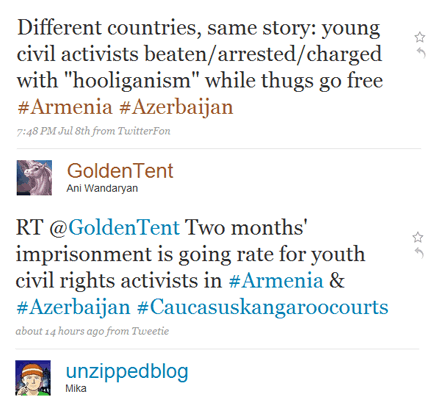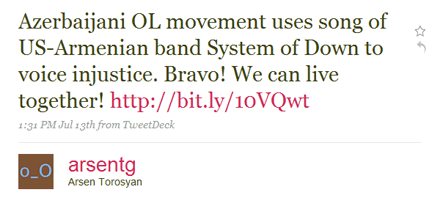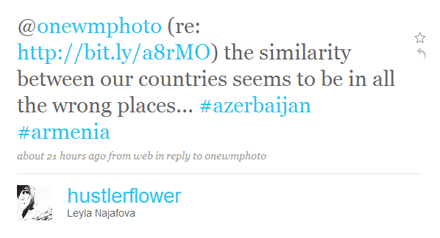The South Caucasus is a fractured region divided by ethnic fault lines and devastated by three frozen conflicts. With most people in the region looking to the past rather than the future, writing on the three republics which make up the region can therefore be very problematic indeed, and especially with an Armenian name. Forget the fact that I’m a British citizen and half-Armenian anyway; there is almost no notion of citizenship in the region. Those forming the majority ethnic groups in each of the three South Caucasus republics don’t quite think in such ways.

Despite the similarities, however, and the obvious need to consider the way authoritarian governments in the region intimidate and silence youth activists, the situation is complicated by the fact that Armenia and Azerbaijan are still technically at war over the disputed territory of Nagorno Karabakh. In such an environment the local media in both countries either censors itself or perpetuates negative stereotypes of the “enemy.” So, if quoting the two tweets would be logical in the larger world outside the region, that’s not the case here.
What I wasn’t expecting, however, was to a receive a message from an acquaintance in Baku not only requesting that I remove them from a post for Global Voices Online, but also attempted to belittle the entry which others appreciated in order to achieve that purpose.
[…] the post seems so ugly, maybe you'd simplify it, make it more readable and attractive? It is unintelligible. And I have a personal request […], can you remove that Armenia reference from the beginning, please?
Reluctantly, and somewhat stupidly, I agreed. However, the matter didn’t stop there. A second message from someone in Azerbaijan followed.
I have read your posts and I know of your take on this position. No matter how discouraging it is going to sounds, I'm going to ask you not to post any links to your articles. If the authorities are tracking facebook activity then they will look for tools to derail our cause; one of which could be them referencing that “Armenians” are behind the attempts to destabilize… […] I hope you will understand.
Of course, I do understand, but the absurdity of the situation is striking. Nothing will ever change if such attitudes and fears are the prevalent ones. Moreover, even if the authorities and pro-government media in Azerbaijan will do anything to discredit pro-democracy activists, the fact is that I am still a British citizen albeit with a weird Armenian name. The situation became even more ridiculous and disappointing when an Azeri friend I was hoping to meet in Tbilisi cancelled out of fear that the authorities in Baku would find out and use it against her.
True, the pro-government media already had a field day when they discovered that Olesya Vartanyan, another journalist with an Armenian name, had contributed to a report on Hajizade and Milli’s detention for the New York Times. For those attempting to shift attention away from the illegality of their detention and suspect court hearings held behind closed doors, it didn’t matter that Vartanyan is not only a Georgian citizen, but also apparently only a quarter Armenian anyway. Of course, with or without Vartanyan, they would have found something else to exploit... and they did.
Indeed, when almost every single notable democracy, human rights and media organization or watchdog backed Hajizade and Milli, the authorities alleged some kind of international conspiracy against Azerbaijan. The obedient and unprofessional Azeri media bought into the argument even if it was actually the illegality of the case and the skilled use of social networks and new media which saw their detention make headlines worldwide while that of activists in Armenia was unfortunately ignored. Frontline’s Matthew Collin saw it that way, anyway.
[…] after allegedly being involved in a fight in a restaurant in the capital, Baku, […] their friends believe they were targeted for their use of online media like Facebook, YouTube and Twitter to build support for pro-democracy youth groups in this oil-rich but politically intolerant country. […] their case has become an international issue partly due to their own networking skills and the mainstream media's post-Iran obsession with online culture, but also thanks to the tireless work of other bloggers […]. link


I would very much like to have more debate among bloggers in Armenia and Azerbaijan, especially young ones, to share experiences and talk about our day to day lives, basically. It’s just made so difference and I think […] we really need some kind of initiative for debate because I would really, really like to see borders opened and conflict resolved and […] be friends with Armenians. Reminiscing, my mum says that when she went to school she had Armenian friends, Russian friends, it was all a mix and I would very much like myself or my children as they grow up to be able to say the same kind of thing to their children and to their friends. link

Another good post, Onnik. It is indeed refreshing to witness some cases of Armenians and Azerbaijanis seeing eye-to-eye, and, certainly, who can deny the intellectual or humanistic in, say, denouncing injustice or sympathising with lives lost in natural calamities? Or even unnatural ones. I know I felt bad for Azerbaijani families when that crazed gunman went through the Oil Academy a few months ago, and I am sure more than one Azerbaijani could understand how families were torn apart in Armenia when that plane from Iran crashed last week.
However, there is a place where the line gets drawn, in my opinion. Nagorno-Karabakh, past and potential future ethnic conflict is a matter of national security, very much a political issue and, as such, it requires a political model, a political approach to resolve it. Armenians and Azerbaijanis can share a meal, do business, do anything really, but this social interaction cannot extend into the political sphere when it comes to resolving such a dispute, I would say.
Can it create common ground so that our societies will get over it, ultimately? I hope so. But I don't believe a bottom-up approach will ever work. The leadership has to sit down and decide that things are okay and then, slowly but surely, the peoples will get used to each other and will certainly come up with a modus vivendi.